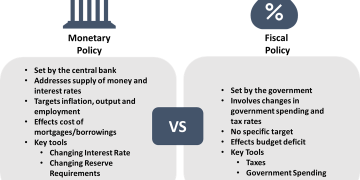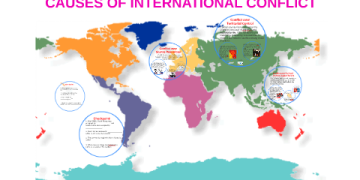1. Problem: The Rise of Global Financial Uncertainty
Global financial markets have been undergoing rapid transformation in the last decade, driven by a series of global challenges. These include:
- Pandemics: The COVID-19 pandemic brought unprecedented uncertainty, disrupting global trade, supply chains, and financial stability.
- Geopolitical Tensions: Trade wars, especially between the U.S. and China, have further destabilized the financial landscape.
- Climate Change Risks: Increasingly, financial markets are facing pressure to integrate climate-related risks, as extreme weather events disrupt economies.
- Interest Rate Volatility: Central banks have raised and lowered interest rates in response to inflation, causing uncertainty for investors.
These elements have created an environment where traditional investment strategies are no longer as effective.
2. Analysis: Key Drivers of Financial Market Change
2.1 The Impact of Monetary Policy on Global Markets
Central banks, particularly in advanced economies, have been altering their monetary policies to manage inflation and stimulate growth:
- Quantitative Easing (QE): By purchasing large quantities of government bonds, central banks have injected liquidity into the system.
- Negative Interest Rates: Some countries have experimented with negative interest rates to stimulate borrowing and spending, but the long-term effects remain unclear.
These unconventional policies have driven financial market behavior, from stock market rallies to cryptocurrency growth, creating new challenges for traditional investors.
2.2 Geopolitical Shifts and Financial Market Responses
Trade disputes and geopolitical conflicts, such as the U.S.-China trade war, have had direct impacts on global markets:
- Tariffs and Trade Barriers: Increased trade tensions have led to a reconfiguration of supply chains and shifts in commodity prices.
- Sanctions and Financial Isolation: Political conflicts have triggered sanctions, affecting financial markets and cross-border transactions.
As a result, investors are increasingly looking for safe havens or diversifying into emerging markets to mitigate risks.

3. Impacts: How Global Financial Markets Are Adapting
3.1 Impact on Investors
Investors are grappling with greater uncertainty in their asset allocations. Asset managers are increasingly turning to:
- Alternative Investments: These include real estate, commodities, and hedge funds, which are perceived to offer protection against volatility.
- Cryptocurrency: Digital currencies are now seen by some as a hedge against inflation, with Bitcoin and Ethereum emerging as popular assets.
3.2 Impact on Governments and Policymakers
Governments are responding by:
- Fiscal Stimulus Packages: To support struggling industries and prevent economic collapse, many nations have launched large fiscal stimulus programs.
- Green Bonds: Environmental sustainability is increasingly being integrated into financial policies, as nations and companies issue green bonds to fund climate-related projects.
4. Future Trends: What’s Next for Global Financial Markets?
4.1 The Shift Toward Digital Assets
As financial markets evolve, digital assets are expected to become even more prominent. Cryptocurrencies, tokenized assets, and central bank digital currencies (CBDCs) are changing how we perceive and trade financial instruments. The rise of decentralized finance (DeFi) platforms is also expected to drive a shift away from traditional banking systems.
4.2 Environmental, Social, and Governance (ESG) Investing
As investors place increasing value on ethical considerations, ESG investing will continue to rise in prominence. Financial institutions are adapting to new realities by adopting ESG criteria, making it easier for investors to align their portfolios with sustainability goals.
4.3 Increased Regulation in the Digital Finance Space
Given the growth of cryptocurrencies and decentralized finance, governments are preparing for increased regulation of digital finance. While this may limit innovation, it will provide more security and legitimacy to digital markets.
5. Recommendations: How to Navigate the Current Financial Landscape
- Diversify Portfolio: Given the uncertainty in global markets, diversifying into multiple asset classes—including alternative investments and cryptocurrencies—is a prudent strategy.
- Stay Informed on Global Events: Geopolitical tensions and monetary policies will continue to influence financial markets, so staying updated is crucial.
- Focus on Long-Term Sustainability: Align investments with global trends, such as the transition to sustainable energy and green bonds.
















































